Why hasn't MT Mastered (yet) video games Localization? a summary of my contribution to W.L. event UK chapter PART 1!
This virus that has crept into our lives in 2020 has undoubtedly tested our ability to reinvent ourselves.
In all senses, both, in the personal/family space where we have been forced to turn our homes into co-working spaces and virtual schools for our children, and in the more professional sphere where we have seen an acceleration in the digitalization of certain professions and the push for teleworking... we adapted to working remotely... and not just working, but presenting, attending virtual meetings and even networking!
This Thursday I had the opportunity to participate in the Women In Localization UK Chapter event entitled "The Legend of Women in Localization: Gaming of our Time"! What a cool event title, I love it!
I find it quite admirable the effort, dedication, and enthusiasm that the different partners in the localization industry invest in each and every one of the WIL chapters that are located in many cities around the globe.
This event seemed to me to be very well organized, I could see the love that people like Jennifer Vela, Eleni Kompoura, Shung Wang, and the whole team of the UK Chapter Manager had dedicated to organizing this event
There on the virtual stage, I had the opportunity to spend a pleasant afternoon with industry colleagues who know their field to perfection.
For example, Kate Edwards presented on culturalization, and in her presentation entitled Building Better Worlds through Game Culturalization, she talked about what to consider when creating virtual worlds and maps to ensure that the video game is respectful with players from different global regions.
Angela Combi from Alpha Games in her presentation "Fast and Curious" talked about the challenges an LSP faces when providing localization services for a wide range of video game publishers.
One presentation that I found super interesting was that of Belen Agullo from Nimdzi Insights, who in her presentation entitled "The Game Localization New Normal: Market Trends, Challenges, and Opportunities" brought all of us in the localization industry a breath of fresh air, an optimistic message that despite how difficult the whole COVID is doing our lives, the future for the localization game industry does not look bad ... and what about me? what did I present? ☺️
Well, my presentation revolved around MT, and specifically why hasn't MT Mastered (yet) video games Localization?
MT is a hot topic since a few years ago, but the adoption of MT in videogames localization, compared to other sectors of the industry is relatively low, so for 20 minutes, I explained why, as I see it, MT hasn't mastered (yet) video games.
In my post this week with the tranquility and comfort that gives me to write from my Swedish chair POÄNG 😬 I want to take advantage and make a summary of why MT and videogames, at the moment are not best friends.
This post will be divided into 2 parts (or it will be a little long). In this first part, I will cover the 3 reasons why MT hasn't mastered (yet) video games
Videogames have a very unique content
The first one is that many gaming industry professionals are still suspicious of a machine producing quality content in a video game (I'm in that group!). For me, it is not that I believe that MT has not evolved. I know that Google is putting a lot of effort to provide access to NMT and Google claims that in some cases, human and GNMT translations differences are quite invisible, but still... I think that statement is not correct for videogames ....or better said, it might be correct for some type of content, but I'm pretty confident that if Google gives me a content sample of a video game translated by a specialized translator in the gaming industry, and a piece of content produced by their NMT engine I will be able to distinguish
My main argument here to put forward my case ....is that a video game is a piece of art - it is culture.
Localizing a videogame becomes a creative endeavor.
A video game is all about transcreation. When localizing a video game we focus on adapting and transferring feelings and emotions, not just on translating words and sentences.
And this is the part that I think that MT struggles when localizing a video game
MT has no sensibility or judgment, no professional experience, no humor, no common sense that allows it to second guess what the original video game narrative designer had in mind.
Professional human localization translators have learned to recognize the complexity and pitfalls in video game localization, while machine translation in most cases succumbs to them every single time.
Machine translation can make at least all the mistakes that a human translator can potentially make, except that a human eventually based on the experience will avoid the majority of these issues and will ask the client for clarification
Localizing with cultural competence matters as much as linguistic accuracy. Localizing a game for a different market, for a different culture requires more than just finding the right words.
The following screenshots will give you a very good understanding of why the content translation in a game is very difficult to automate
This example from a promotional campaign for Bubble Witch 3 Saga from King the slogan was Want some dairy. And the approach that the different translators took was creative translation also known as transcreation. As you can see translation is actually freestyle and the English version is used as a mere reference.
With content like this MT suffers and the localization, quality is not at the level of a good localization professional.
“In the gaming industry, the accuracy of the translation is not the main criteria to judge the quality of the translation, it’s the player experience what in the ends matters.”
Even if we get a raw output from MT that from a grammar perspective it could work, at the end of the day that's not enough to build a great player experience.
Great playing experience in video games is achieved through cultural immersion, no text accuracy.
This can be seen in this other example of another King game called Blossom Blast Saga
The game and its narrative content are very visual, very musical, very poetic and it is quite common to see poems along with the different levels that we face in the game. MT skills for poetic content has not progressed enough yet to be a serious alternative to a good translator!
A video game in a certain way is like a movie, it has characters that speak peculiarly, for example in Paradise Bay action takes place on an island, and on that island, we meet Pike, a pirate who speaks in a somewhat strange way, speaks in a pirate language, as of today MT does not have pirate language in the pair of languages☺️ , therefore, this type of content is very difficult content for MT to localize
When a translator finds texts like this, she will know how to translate it, it may be difficult at the beginning, but she will soon get the hang of it and will know how to adapt the dialogue to fit the narrative of the game
Summarizing The more creative the text to localize, the more difficult it is for MT to produce a usable copy.
MT can work very well with controlled English, technical text, but MT today has many difficulties to localize a creative copy
2. Underestimation of the effort required to implement MT in the workflow
The second reason why I believe MT has not fully landed yet in videogames is that Implementing MT is not cost-free, although it’s true that the first thing that comes to mind when we talk about MT is the free-to-use Google Translate. The reality is that Google Translate is just the tip of the iceberg when it comes to MT solutions.
MT is not free, many people embrace the idea of MT because it's perceived to be cheap, but the reality is actually different.
MT is neither free nor cheap, and its implementation requires a costly investment in resources and time.
And something that I like to emphasize here, is that MT usually has a hidden cost, and the main one is the cost of training and improving your MT engine, so eventually the accuracy might get better.
This is something usually overlooked when MT is on the table as a localization method for video games.
MT technology requires continuous iterations from copy editors to improve their recognition models. And all this effort takes time, sure the more we train the model the better the recognition of the pattern eventually will be, but many people when they realize about the actual effort that it takes to use MT will come down with their expectations and the hype to use MT start vanishing ...
3. Many games total word count is rather low
The third main reason why I think that MT has not conquered yet video games, it’s that MT is especially useful and brilliant when we have hundreds of thousands of words or even millions of words.
But in the video game industry, there are not many games with huge word count. Sure there are very complex games with very heavy narrative, World of Warcraft might be an example of that, but many games especially in the mobile industry they are not that big; and you might think that the traditional gaming industry, like console games or PC games, is the majority, but the reality is different.
And the truth is that the mobile market is the one that grows the most, it has been growing for years and already represents more than half of the global video game market… and a mobile game does not have many words.
Many mobile games do not exceed 5000 or 10000 words ... and the localization volumes of a mobile game in which we work under a continuous localization model do not usually exceed 100 words on average in a sprint ... and it is in these circumstances where MT is not in the best scenario to shine.
MT is useful when there are thousands of words, but many mobile games are the opposite, with few words, few repetitions, and all that also surrounded by creative content. That's the nightmare of an MT engine.
In conclusion, there are 3 main reasons while MT is struggling to be massively accepted in the video games industry.
The first one is that Video games are a piece of art with very creative content, and MT struggles when content is more creative and less repetitive
the second one is that Apply MT with the hope to localize your game for free is not the right mindset, and this will eventually derail your localization strategy
and the third one is that the mobile game industry is growing year after year and it’s a platform that it’s expected to keep growing … and mobile games are not that heavy in terms of word count, therefore MT has fewer opportunities to shine when all that we translate is a couple of thousands of words
Next week I'll cover in the second part of this post as if despite everything I've told you, you want to explore MT as a tool to localize your video game, where you could start.
See you next week!
@yolocalizo
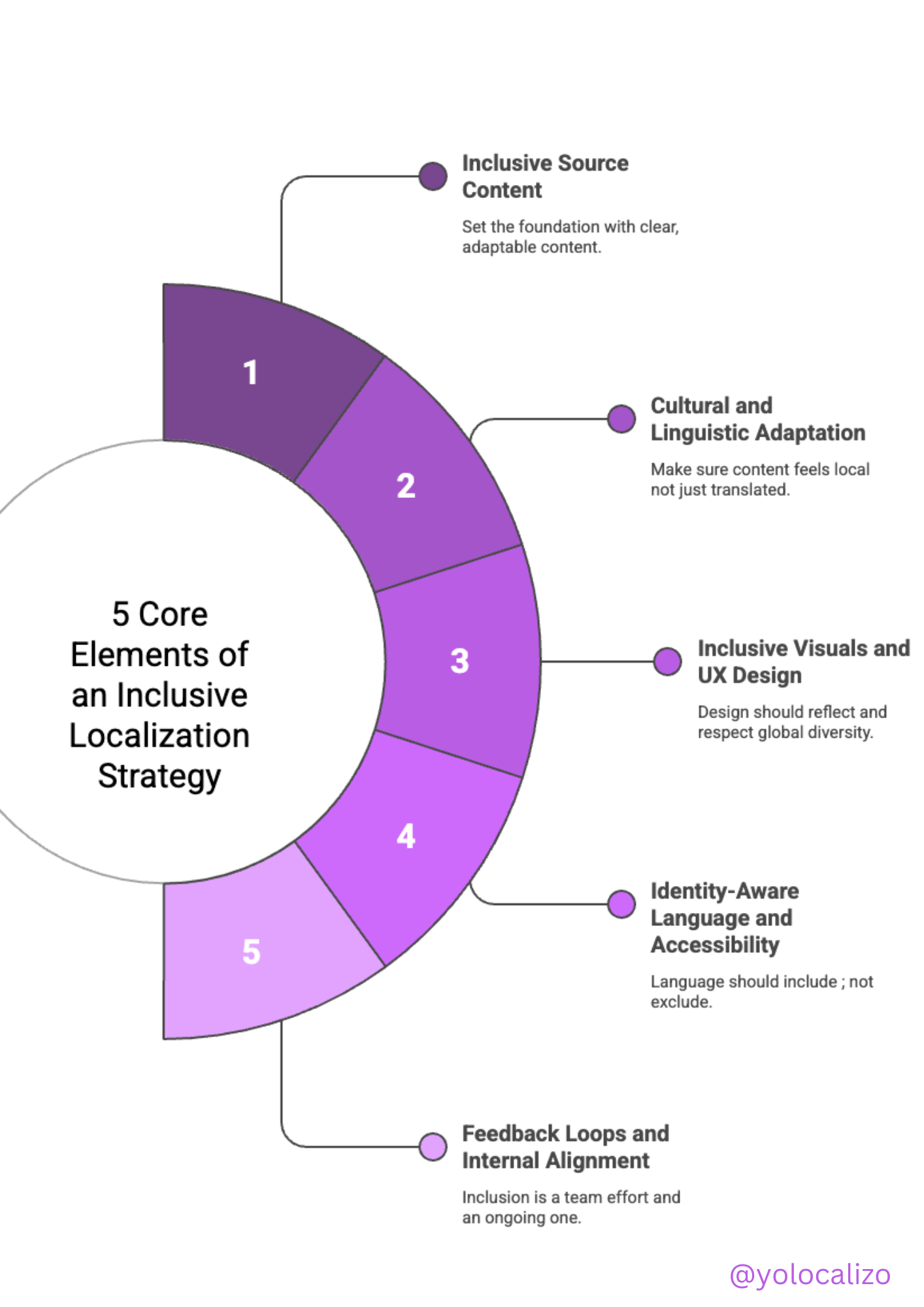

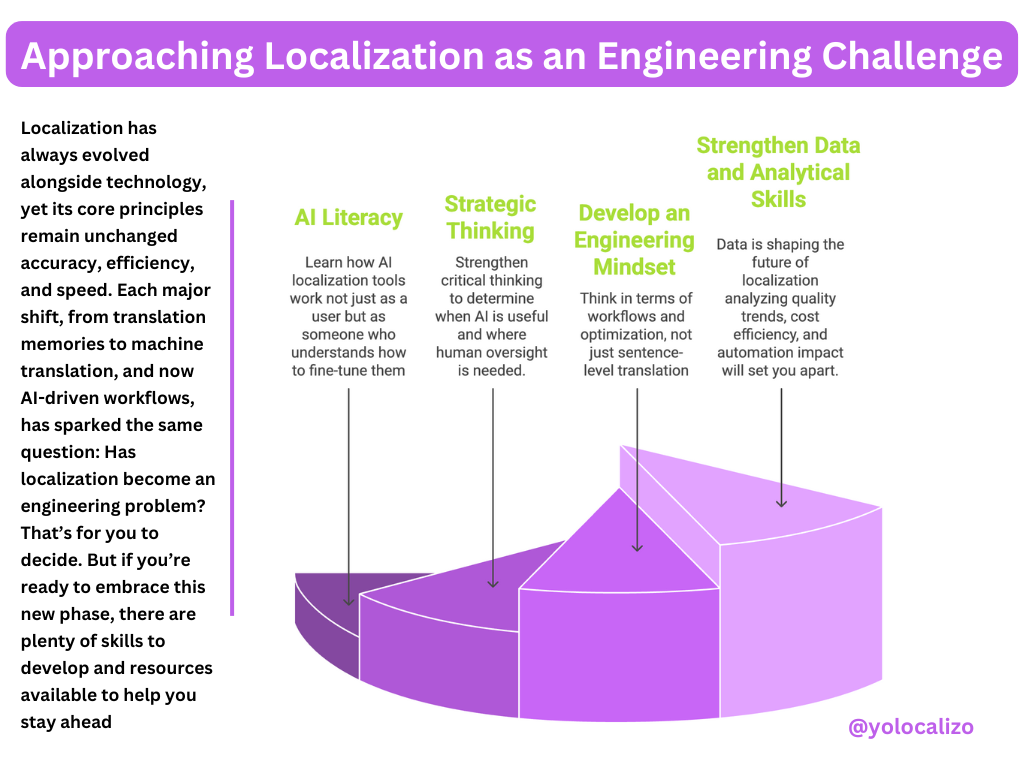
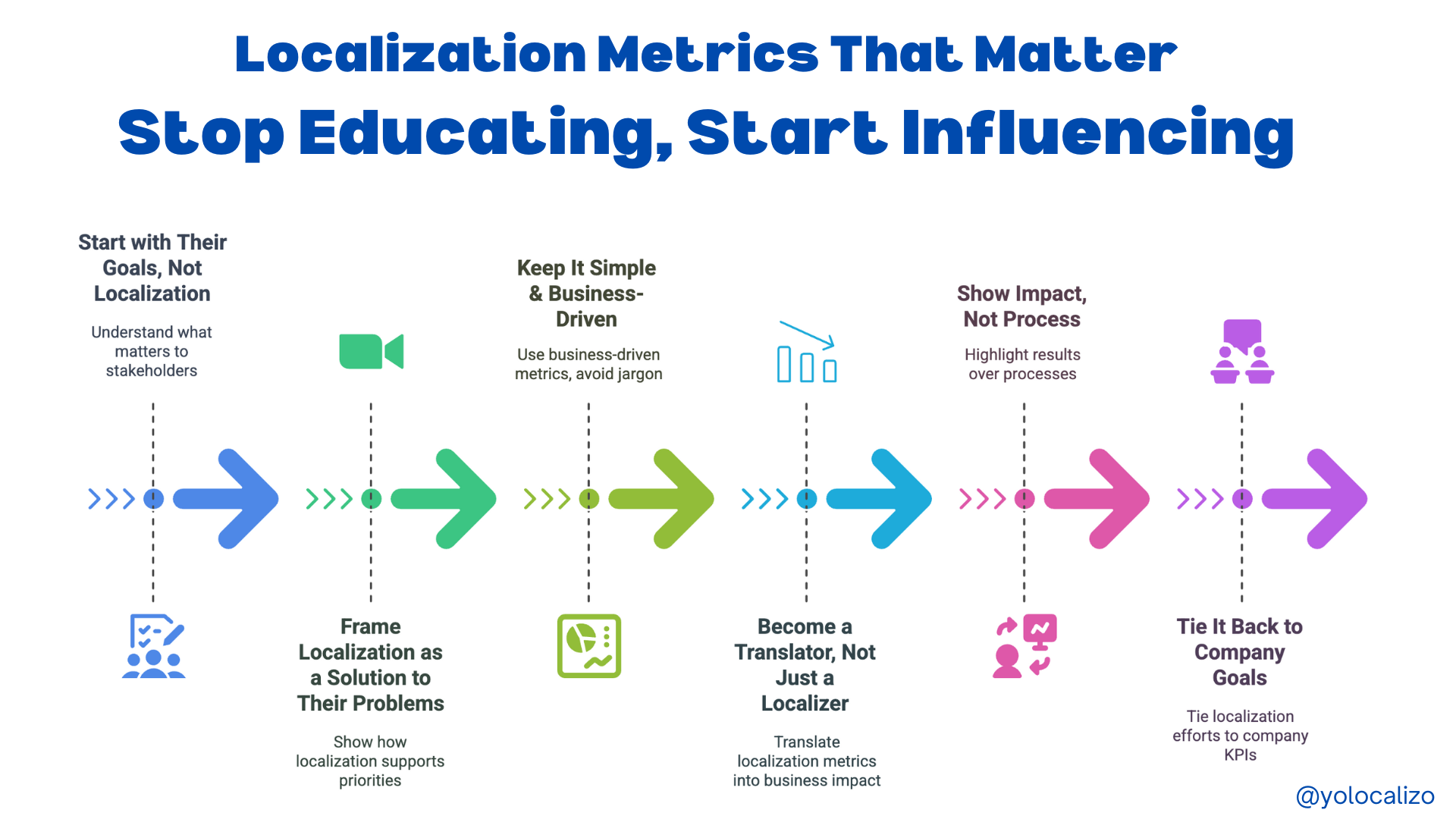


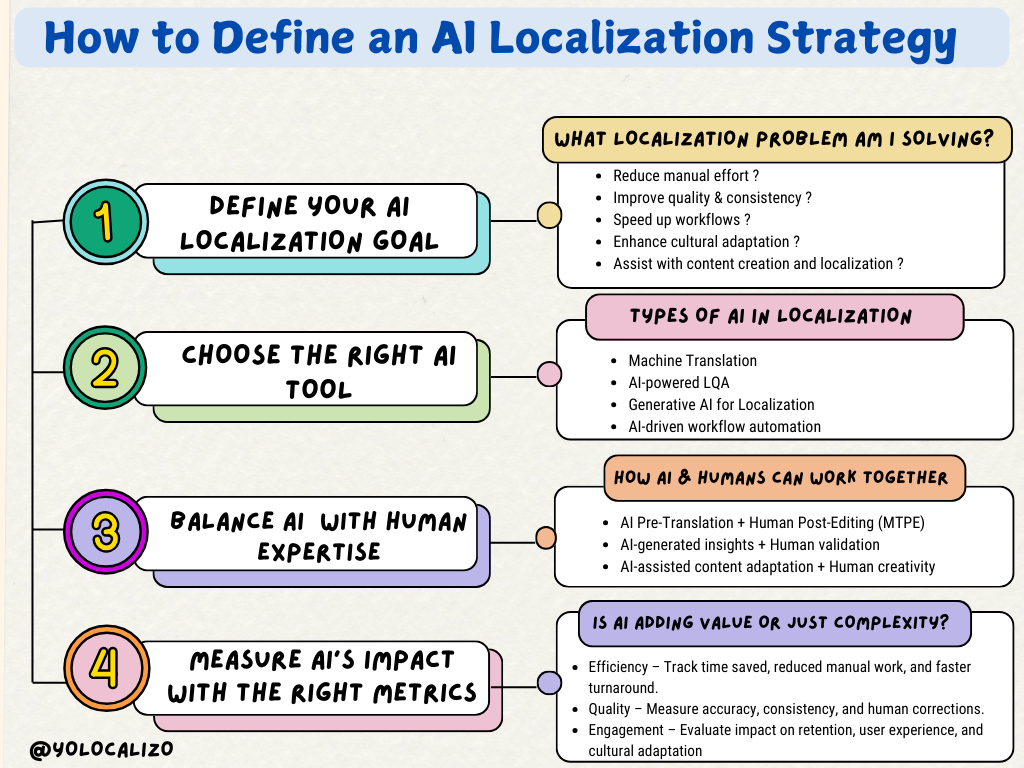











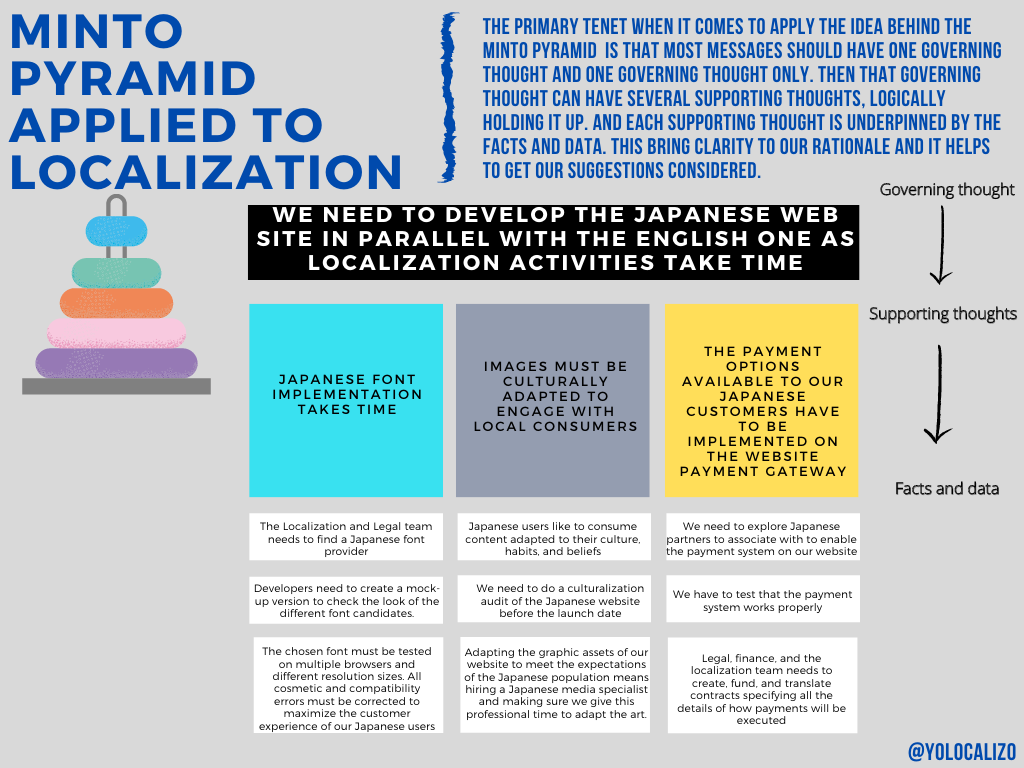
Localizability has always been a challenge small issues in source content often lead to big problems later in translation. In this post, I explore how AI is giving localization teams a powerful new way to improve source quality, reduce friction, and create better content for every market right from the start.